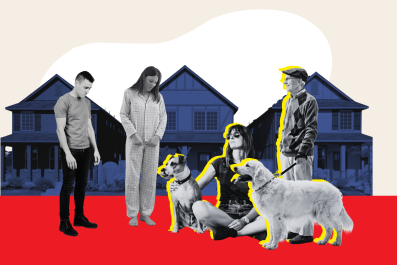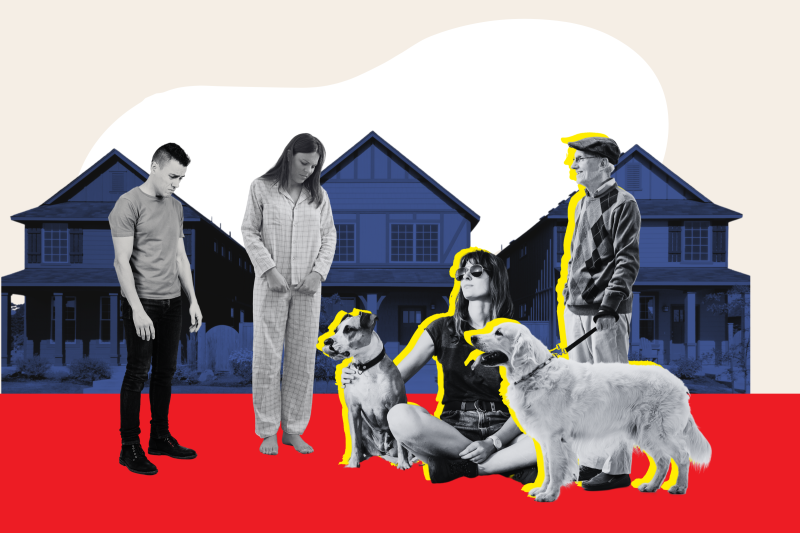
Americans Don't Trust Their Neighbors With Their Pets
A recent survey by Talker Research for Newsweek revealed that Americans are picky about who watches over their pets, with people entrusting their neighbors the least.
About 66 percent of people surveyed strongly agreed with the statement that they consider pets part of the family. Like children, parents want the best for their pets. This often includes carefully selecting someone to watch their pet when they are not available.
Owners have options when it comes to selecting a pet sitter—family members, friends, neighbors, boarding facilities or professional sitters—but the unifying feeling among different generations showed that neighbors are the least trusted.
Only 5 percent of 1,000 participants said they would entrust their neighbors with their pets, the lowest percentage of the options.
The research found pet parents across generations felt the same. No participants from Generation Z, aged between 18 and 27, selected that they would trust their neighbor with their pets. Millennials, Generation X and Baby Boomers surveyed about the same percentage at 6, 5 and 7 percent, respectively. Like Gen Z, zero of 21 surveyed from the Silent Generation selected their neighbors to be most entrusted with their pets.

The findings don't surprise Lisa Milot, a professor of canine welfare law and practicum in animal welfare skills director at the University of Georgia School of Law, for a variety of reasons. She shared with Newsweek that one of her theories behind the research is that people are more transient these days.
Remote working and flexible scheduling have allowed people to live in new areas, sometimes bouncing from city to city. Data gathered from Apartment List found those with remote working situations are 56 percent more likely to move than on-site workers.
And with constant moving comes a new set of neighbors.
Thinking back to when she grew up, Milot remembers knowing and trusting her neighbors, although she noted she might be romanticizing it. Now, she believes the rental market moves people in and out at higher rates and building relationships with your neighbors might not be as it once was. There is less desire to get to know your neighbors as they could leave within a year.
Family Over Neighbors
The survey's findings revealed that most people would trust family members to watch their pets, which Milot credits to adult children living with their parents more often.
"Because of the cost of housing, a lot of millennials and younger generations are living at home," Milot said. "There is less of a need for an outsider to watch your pet."
Children and parents living together under one roof might have opposite schedules or travel at different times. That means the other would be home and can look after the pets when one goes. They wouldn't have to rely on a pet sitter or a friend to take over the responsibilities.
Pet Sitters
Although only 7 percent selected pet sitters, Milot believes that option still ranks above neighbors from a legal perspective. Owners hiring pet sitters can expect them to have expertise and insurance. Although not required, pet sitters are strongly recommended to be insured because they are finally responsible for accidents, damage, or theft, according to Canine Journal.
"Even though pet sitters might have the same expertise as neighbors, we think of them as a step up from that," she said.
When thinking about her pets—six dogs at the moment—Milot said she always uses a pet sitter. She has been using the same one for about 15 years.
Neighbor Tensions
Milot and her students work on cases between neighbors regarding pets. There is often tension between neighbors. Perhaps a neighbor is annoyed about a dog barking too much, where they select to go for a bathroom break, or a cat roaming around their yard.
If not the neighbors, then who do Americans trust with their pets? Siblings came out on top, with 23 percent of participants selecting that option, followed by 22 percent for parents, friends at 19 percent, extended family members at 17 percent and pet sitters at 7 percent. Eight percent selected none of the provided options.
This random double-opt-in survey of 1,000 general population Americans was commissioned by Newsweek between September 11 and September 13. It was conducted by market research company Talker Research, whose team members are members of the Market Research Society (MRS) and the European Society for Opinion and Marketing Research (ESOMAR).
